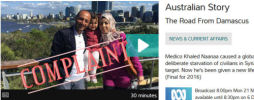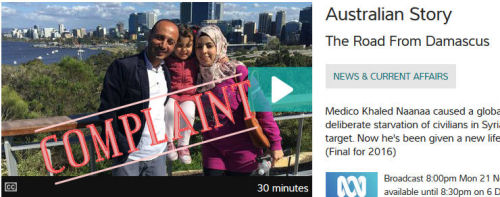Letter to ABC: Australian Story Road to Damascus lacked context and balance
 The suffering of the civilians of Madaya is terrible but it is the armed men who have infiltrated their town who bear the first responsibility for their plight. No government in the world could allow a situation to continue in which a terrorist group is holding a civilian population hostage. This is the reality of Madaya. Knowing the essential facts there is surely no Australian watching your ‘Australian Story’ who could regard a group like Ahrar al Sham with anything other than abhorrence yet in your report on Madaya this group is not even mentioned. Neither is there any attempt to question Mr Nanaa about his dealings with this group and possibly his affinity with its ideology. It is certain that he could not have operated in Madaya without its support and without at least appearing to support its aims, The outcome is a report that is superficially heart-warming but is by no means the true story of what lies behind the ‘siege’ of Madaya."
The suffering of the civilians of Madaya is terrible but it is the armed men who have infiltrated their town who bear the first responsibility for their plight. No government in the world could allow a situation to continue in which a terrorist group is holding a civilian population hostage. This is the reality of Madaya. Knowing the essential facts there is surely no Australian watching your ‘Australian Story’ who could regard a group like Ahrar al Sham with anything other than abhorrence yet in your report on Madaya this group is not even mentioned. Neither is there any attempt to question Mr Nanaa about his dealings with this group and possibly his affinity with its ideology. It is certain that he could not have operated in Madaya without its support and without at least appearing to support its aims, The outcome is a report that is superficially heart-warming but is by no means the true story of what lies behind the ‘siege’ of Madaya."

Letter to the ABC
Dear Sir/Ms,
I am writing with reference to the ‘Australian Story’ program, entitled ‘The Road from Damascus’, screened on November 21, 2016. The program dealt with the situation in the ‘rebel-held’ Syrian town of Madaya, not far from Damascus. The program succeeded in conveying the message of the suffering of civilians but even insofar as it went it lacked context and balance. The outside sources quoted included the Syrian American Medical Society and the Syria Campaign, both of which groups are aligned/embedded with ‘rebel’ forces in Syria. A third source was the US ambassador to the UN, Samantha Power, a person whose extreme views on Syria are too well known to need recounting here.
The frequent references in the program to the ‘regime’ are consistent with mainstream media mis/representation since the beginning of this conflict. Syria does not have a ‘regime’. It has a government with voter support in presidential and parliamentary elections in recent years surpassing the percentage of voters who turned out for the recent American elections. Outside monitors from many countries confirm that these elections have been held fairly and without government intervention. The anti-government demonstrations to which your program refers were vastly outnumbered in 2012/2013 by the masses of people turning out in support of the government. Far from anti-government protests only turning violent because of the violence of the ‘regime’, as your program suggests, they were violent from their beginning in the southern city of Dara'a. Many police and soldiers were killed in the first weeks of this ‘uprising’ and while I have no firm evidence, it is my belief that the snipers firing into demonstrators, as mentioned by James Sadri, of the Syria Campaign, by implication government security forces, were in fact agents-provocateurs.
Sophie McNeill admits developing a close personal relationship with the main character in this Australian ‘story’, Khalid Nanaa. This clearly affected her ability to tell this story as it should have been told according to the standards of objective journalism. Mr Nanaa is presented as a well-meaning naif driven by good intentions and ending up providing medical assistance in the 'rebel-held' town of Madaya. The viewers were informed that ‘only now’ is he telling his story of ‘everything that happened in Syria’, which clearly he could not do, seeing that he was living either in Damascus or Madaya. This was sheer hyperbole. At one stage Mr Nanaa (a nurse and not a doctor) says he decided to treat any patient who came to see him in Madaya. His patients clearly included many children, but what we needed to know is whether he also treated wounded ‘rebels.’ My guess would be that he did, given that the ‘rebels’ control Madaya and would frequently be in need of medical services, but this question was not even asked. There is immediate sympathy for suffering children but what would have been the effect on viewers of seeing heavily bearded jihadists being treated by Mr Nanaa? The propaganda effect would certainly have been spoiled.
Your viewers were entitled to know who these loosely defined ‘rebels’ actually are, but Sophie McNeill did not take up this issue any more than she asked Mr Nanaa about his relationship with them. The answer to the question she did not ask about the ‘rebels’ holding Madaya is that they are members of one of the most violent takfiri/jihadist groups in Syria, Ahrar al Sham.
There is no shortage of detail about the background, the intentions and methods of this group. Your researchers could have turned to Nafeez Ahmed’s article in Middle East Eye (October 16, 2015), ‘Ahrar al Sham’s Apocalyptic Vision for Syria and Beyond’. Ahrar al Sham maintains a close working relationship with the recently rebranded Jabhat al Nusra (Al Qaida in Syria) and the Islamic State and is a central pillar of the extreme jihadist fighting coalition known as Jaish al Islam (Army of Islam). It has a long record of shocking atrocities to its name including, in May 2016, the massacre of Alawis, including women, children and old men, in the Homs governorate village of Al Zara; including, in March, 2015, the massacre of Christians in Idlib; including, in August, 2013, participation in genocidal attacks on Alawi villagers in Latakia province, with an assortment of takfiri groups massacring upwards of 200 villagers and abducting dozens more.
While an estimated 20 groups took part in this slaughter, the US organisation, Human Rights Watch, named Ahrar al Sham as one of five groups, including Jabhat al Nusra and the Islamic State, that were the key fundraisers, organisers, planners and executors of the attack (see the HRW report, October 10, 2013, ‘You Can Still See Their Blood’. Executions, indiscriminate shootings and hostage-taking by opposition forces in Latakia’). On May 13, 2016, Amnesty International included Ahrar al Sham among takfiri/jihadist groups responsible for ‘repeated indiscriminate attacks’ that may amount to war crimes in northern Syria, along with allegations that it has used chemical weapons. Yet the head of Ahrar al Sham in Madaya believes that it is ‘the best group to bring justice to Syria.’
Ahrar al Sham has been accused of hoarding food and profiteering in Madaya. Whether or not these accusations are true, it is certainly not true, but in fact a slander, that the civilian population is being intentionally starved to death by the Syrian government, as one speaker in your program claims. The provision of supplies to Madaya has depended on the outcome of negotiations between the government, UN mediators and Ahrar al Sham and does not depend solely on decisions taken by the government in Damascus. It is the difficulty of getting all parties to agree on the opening of a humanitarian corridor that has repeatedly stalled the supply of food to the civilian population of Madaya.
Like eastern Aleppo, Madaya is held by a thoroughly murderous sectarian group armed and financed by outside governments, including the government of Saudi Arabia, one of the most reactionary regimes - a true regime - in the world, which is concurrently running another war, against the Shia population of Yemen. Ahrar al Sham’s enemy is not just the Syrian government or the Shia and Alawi it has massacred but Christians and Sunni Muslims who do not conform to its murderous ideology, which differs from the Islamic State’s only on minor points of theological detail.
The suffering of the civilians of Madaya is terrible but it is the armed men who have infiltrated their town who bear the first responsibility for their plight. No government in the world could allow a situation to continue in which a terrorist group is holding a civilian population hostage. This is the reality of Madaya. Knowing the essential facts there is surely no Australian watching your ‘Australian Story’ who could regard a group like Ahrar al Sham with anything other than abhorrence yet in your report on Madaya this group is not even mentioned. Neither is there any attempt to question Mr Nanaa about his dealings with this group and possibly his affinity with its ideology. It is certain that he could not have operated in Madaya without its support and without at least appearing to support its aims, The outcome is a report that is superficially heart-warming but is by no means the true story of what lies behind the ‘siege’ of Madaya.
Yours sincerely,
Jeremy Salt
[Candobetter.net Editor: Click here for more on Jeremy Salt.]

Recent comments